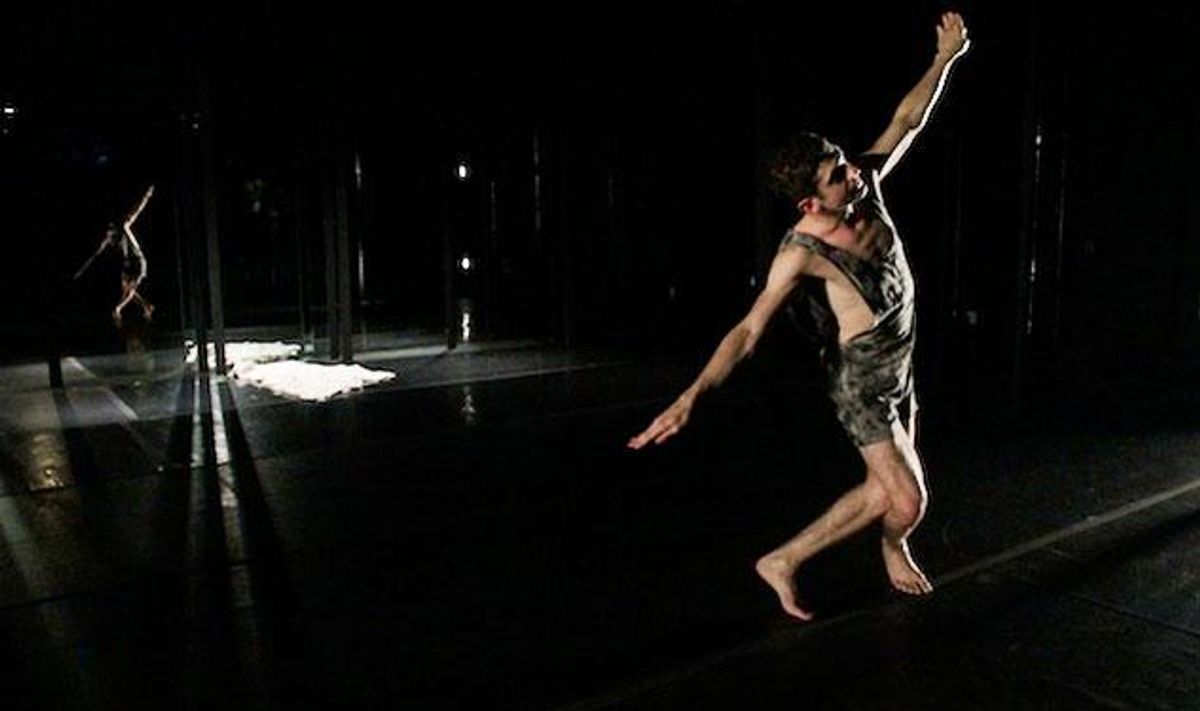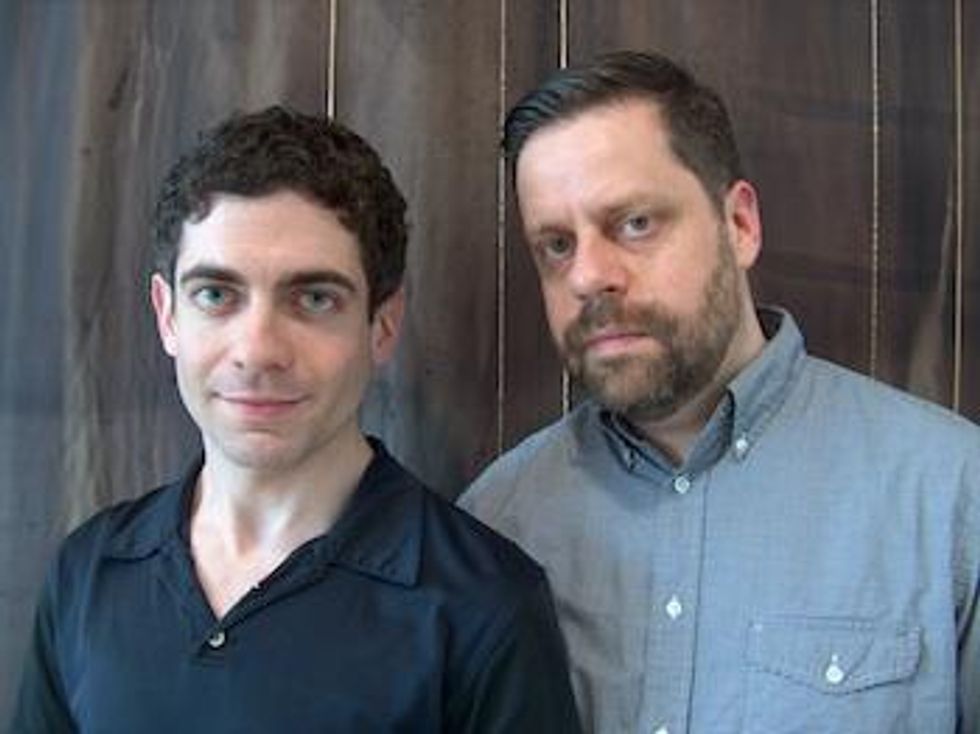Popnography
Jack Ferver Tells All

Childhood fantasies mix with adult obsessions in the choreographer's exploration into the abuse of queer youth. It gets better? Maybe. Maybe not.
May 18 2012 1:09 PM EST
May 26 2023 2:39 PM EST
jerryportwood
By continuing to use our site, you agree to our Private Policy and Terms of Use.

Childhood fantasies mix with adult obsessions in the choreographer's exploration into the abuse of queer youth. It gets better? Maybe. Maybe not.
Jack Ferver doesn't believe in having much separation between his life and his art. While we were on the telephone to discuss his upcoming production of Two Alike at The Kitchen--a solo work that is a collaboration of his choreography with sets by the artist Marc Swanson-- we were also being recorded by filmmaker John Fireman for a planned documentary. And then Ferver explains how this is only one scene, he hasn't had time to go on a date recently, so he "scripted" another scene for a dating experience with a guy he had met via Facebook.
"I have cut off all channels for any sort of dating and personal life, Ferver explained. "So, I just wrote a scene for me to have this date with this actor, and it would then progress. He's a friend of John's, and we met on Facebook. To him, it was kind of reality, we've known each other for about a year. We read the scene just as honestly as possible. I feel: It was really exciting. I've never done anything like that before!" Did I mention that filmmaker Rainer Werner Fassbender is one of his big influences?
But currently Ferver is taking his creative skills to the stage. Two Alike is a psycho-sexual semi-autobiographical choregraphic piece that explores the bullying, terrorizing, and abuse Ferver suffered as a child. It sounds like dark stuff, for sure, but Ferver, who has a mischevious streak combined with a nymph-like grace--secured with those big, blue eyes that are sure to captivate--always manages to bring humor to whatever project he's working on. We talked about his creative process, his experiences of bullying, what it was like to work with another queer artist, and having the New York Times dance critic tell the world he has "Bette Davis eyes."
I know this piece, Two Alike, is supposed to be about your experiences of abuse but what motivated you to work on this piece rather than something else?
My main reason for making art is so that people don't feel as lonely as I have felt. And so by using certain elements of my own life, juxtaposed with our mythologies, I find that a work is created that is at once honest and yet a total reading of the situation. So that I have an entry point through honesty, and the audience has an entry point.
I'm not a fan of indulence, likewise, I'm not a fan of work that I'm closed out of. I don't make my work for the dance community or the theater community or for any community. I make my work for everyone. I think that I want my work to be accessible to all and to be able to have a catharsis.
I also grew up in a town in rural Wisconsin mercilessly picked on. Abused and bullied. Without my imagination and creating these other worlds, I wouldn't have survived. That started coming up to me. I started wondering, When was the last time that I had been alone? That's where these came from.
So what is the process that got you from your original idea to this point? I know it's a very serious piece, but it also seems to have some humor? Or is it a form of therapy?
I will create a thing and rehearse it to the bone. The piece I'm making, it's not about the way I've dealt with my abused youth. It would be really dangerous ground if it were therapy. Dangerous for myself and for the audience. I'm making this piece because I feel I've told you where it came out of artistically and politically. The campaign that these kids are able to access--or most of them--is actually someone on YouTube, and the people are far away.
I think it is great for children--children get to have hope--it may help them survive. However, for adults, I think it is important to remember how bad things are: That children are still being bullied to death, and that we have a continued responsibility to as adults to help them and to try to stop ignorance, hatred, and cruelty.
Hope says there's someone better to be. I needed to know that someday that I wasn't going to be going through this hell. And I would be able to see and have a big, beautiful, sexy life. I think that's great for the children, but for the adults, those in positions to take care of the younger ones? It hasn't gotten better for most of us.
Well, this is all actually really fascinating to me. With all of the anti-bullying rhetoric out there, and with people who will claim, 'Being gay isn't who I am, it's a just a part of who I am,' I will argue: I would have been a completely different person if I hadn't been ostracized or marginalized by being other. It seems that, no matter how horrible, the bullying also allowed you access to your creative self?
I would definitely say that's true. I can't speak to when people say, "Being gay is not who I am." But I would say, I premiered this work in Houston first. I was approached after it by gay people but also by other people who had horrible childhoods. They all suffered from some form of xenophobia, beyond the gay card.
I know what it is to have been terrorized and isolated and really horribly abused as a child. And have the ramifications of that as an adult. I think there's a lot of people outside of the gay community that have similar experiences and stories. It's unfortunate that we don't all come together. It is all a sense of feeling one's self as a minority. It continues in one's adult life. The trauma that I expriened as a child, it has completely affected all elements of my life. With this piece, it's something that I've realized with my ability as a performer and as a creator of artwork.

Working with Marc has changed my work; it's changed my practice. He's really helped me discover elements of my work; he's an incredible dramaturg in so many ways. I already have Josh Lubin-Levy, who is a dramaturg. But working with Marc has been an incredible gift--not only my practice, but he's older and has been in the game longer. That is so huge.
There are things he's taught me about what it is to work as an artist: for less money but you work that hard. And eventually it pays off. That has been a huge deal. The fact that I'm able to do this solo work but, at the same time, in collaboration with Marc. And at the same time, working with these incredibly talented and fun dancers at Julliard... Working on a company of 18. That in itself is so exciting.
I have to ask, when Claudia LaRocca wrote in a New York Times piece about your "mad blue Bette Davis eyes," what was that like?
[Laughs] Ha. I'm trying to do the thing about my eyes. Well, it's something that, if you were in front of me, and we were doing this live, I'd say: "These old things?" It's deeply flattering. I grew up watching old movies. I grew up with Dynasty, Twin Peaks...well, I grew up watching a lot of things. I remember seeing Dangerous Liaisons at 10 years old and a lot of other inappropriate movies. What is it like for the [dance critic of the] New York Times to describe my eyes? I think she hit the nail on the head with that one. I think that would be an italicized moment. That would be my moment of italicizese. (In terms of what I was just saying.)
If I would have known as a little gay kid the New York Times would write about my work as favorably, as challenging and evocatively, and also describe my eyes physically as Bette Davis eyes? I guess, for me, what did translate from that is from when I was being picked on. And people would agree: I was one of the people who was being singled out in this town. The flip side of that is, a lot of focus was on me. A lot of focus was on me, and it fueled such a sense of otherness. I had to make it. I had to do something with that.
You mean you used your otherness, your queerness, to be something?
Beware of the Straightors: 'The Traitors' bros vs. the women and gays